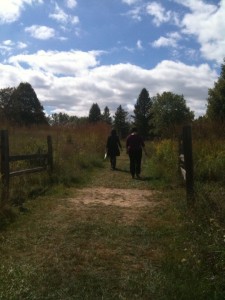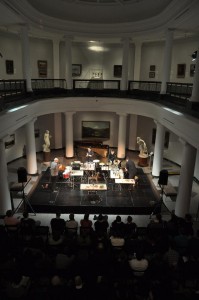Stew, Space, and UMS: UMS Off-site
 Can you imagine how it would feel to watch a football game on the stage of Hill Auditorium? Or how about listening to a string quartet in the Michigan Stadium? Just plain wrong, right? These questions are comical, but not unlike the questions UMS has to ask when deciding on where to present our artists.
Can you imagine how it would feel to watch a football game on the stage of Hill Auditorium? Or how about listening to a string quartet in the Michigan Stadium? Just plain wrong, right? These questions are comical, but not unlike the questions UMS has to ask when deciding on where to present our artists.
The subject of venue space is an important factor in arts presentation. By its nature, each venue has a character or personality of its own. When exploring the choices of where to present a particular artist, UMS has several factors to consider. First, we must consider whether the venue can deliver practically and technically for the performer. Second, is the place acoustically right for this performer? The third and possibly most important question is does the space add or subtract from the experience as a whole?
This week UMS presents Tony award-winning Stew and his eclectic and theatrical band, the Negro Problem. Stew and the Negro Problem combine biting social satire, gritty folk with psychedelic pop. When UMS decided to present Stew, the subject of space–where to present his concert–was an extra hot topic around the UMS offices. What kind of space would give patrons the best Stew experience? We wanted a space that we could make into our own. We searched for a space that is casual, cabaret and would allow the audience to move around throughout the concert. We wanted a space that was grungy and downtown; a place that perhaps could feel a little bit like New York City for Stew and the audience. We found all these factors and more in the warehouse-like space at 523 S. Main Street, which is the former Leopold Brothers. Come check it out.
UMS loves playing with space and has been presenting off-site for decades. Here are, in no particular order, our top 10:
1. Twelfth Night by the Globe Theater in the Michigan Union Ballroom (November 18-23, 2003)
2. Susurrus at the Matthaei Botanical Gardens (September 9 – October 3, 2010)
3. River , a butoh-inspired work by Eiko and Koma in the Huron River/Nichols Arboretum (September 11 and 12, 1998)
4. A concert by U Theater from Taiwan in the Nichols Arboretum (September 16-20, 2003)
5. So Percussion’s strolling concert through the U-M Museum of Art (February 6, 2010)
6. James Galway’s mini concert at the Gandy Dancer Restaurant (March 11, 1999)
7. Shostakovich String Quartet concerts in the Apse at UMMA (January 25-29, 1994)
8. Jazz @ Lincoln Center Swing Dance “participatory concert” at the EMU Convocation Center (February 4-5, 2000)
9. The Vienna Philharmonic at the Detroit Opera House (February 27, 2003)
10. Pushkin’s Boris Godunov directed by Declan Donnelan at the U-M Sports Coliseum (October 29 – November 2, 2003)
Do you have a favorite UMS experience from a off-site performance?
Who Is Stew?
Stew is Mark Stewart.
Stew is Mark Stewart’s stage name.
Stew is an artist.
Stew is African American.
Stew is from Los Angles.
Stew is a composer, musician, and poet.
Stew is creative collaborators with bassist and vocalist Heidi Rodewald.
Stew is a two-time Obie winner.
Stew is a 2008 Tony Award winner for his evening-length Broadway musical Passing Strange.
Stew is a co-resident of New York City and Berlin.
Stew is big.
Stew is gentle.
Stew is angry.
Stew is sweet.
Stew is communicative.
Stew is honest.
Stew is smart.
Stew is powerful.
Stew is magical.
Stew says, Black men ski:
Get to know Stew this week when he performs in Ann Arbor. Discover who Stew is to *YOU* by checking out his artist interview “Post Minstrel Syndrome: A Public Conversation with Stew” this Wednesday, November 17 at 7:00pm at 523 S. Main Street.
Additional UMS 10/11 Events
UMS is pleased to announce additional concerts in the 10/11 season that are not part of our genre-specific packages. These events are all part of UMS’s popular Monogram Series, which allows audience members to select at least five events and receive a 10% discount.
Rosanne Cash: The List
Saturday, September 25 | 8 pm
Hill Auditorium
When Roseanne Cash was 18 and on the road with her father, the incomparable country music superstar Johnny Cash, he became alarmed at the number of songs that she didn’t know. As the tour progressed, he developed a list on a legal pad — “100 Essential Country Songs” — and gave it to her with a thinly veiled admonishment that she needed to do her homework. Now, more than 30 years later, Cash has selected a dozen songs from the syllabus presented to her by her father and has recorded her first album of covers, filtered through her own unique, sophisticated perspective. The List presents Roseanne Cash like you’ve never heard her before, as she embraces her heritage and sings for the pure love of these songs that have shaped who she is as an artist.
Mariachi Vargas de Tecalitlán
Saturday, November 6 | 8 pm
Hill Auditorium
With a history that dates back to the late 1890s, the Mariachi Vargas de Tecalitlán was founded in a small city near Jalisco by Don Gaspar Vargas. This band basically invented the modern mariachi, and five generations later, are still playing today. The group spent its formative years defining their sound and experimenting with different instrumental lineups. Today the group is comprised of two harps, one vihuela, one guitar, one guitarron, two trumpets, and six violins. The songs they sing cross over from one generation to the next, making their performances appealing to both young and mature audiences. Recognized as “el major mariachi del mundo” (the greatest mariachi in the world), Mariachi Vargas are the masters at melding the old world style of mariachi music with new innovative pieces.
Stew and The Negro Problem
with Heidi Rodewald
Thursday, November 18 | 8 pm
Friday, November 19 | 8 pm
Saturday, November 20 | 7:30 pm & 10:30 pm
Location TBA
“Stew’s endlessly inventive music draws on rock, gospel, soul, and blues…A winning tribute to the diversity of the black musical experience.” (Hollywood Reporter) Songwriter Stew’s career took an unexpected turn in 2006. After a successful career fronting his critically acclaimed bands, Stew and The Negro Problem, he transformed his life story into the rock musical Passing Strange. The show, co-composed with Heidi Rodewald, earned him the 2008 Tony Award for “Best Book of a Musical” and attracted the attention of Spike Lee, who produced the film, which premiered at the 2009 Sundance Film Festival and airs on PBS’s “Great Performances.” Compared in the same breath with Kurt Weill, Burt Bacharach, and Jackie Gleason, Stew’s concert performances are coveted for their literate precision, sly humor, and deep emotional resonance, hovering between the divergent worlds of rock and theater. “Something hipper for the hipper…Stew is a very genial and lovable guide through the common travails of life. Like a lot of fine writers and musicians, he has the ability to layer reflexive self-doubt into his music and lyrics…very witty, very smart.” (Chicago Tribune)
Carolina Chocolate Drops
Friday, December 3 | 8 pm
Michigan Theater
“Tradition is a guide, not a jailer. We play in an older tradition but we are modern musicians,” says Justin Robinson, a member of the popular bluegrass band, the Carolina Chocolate Drops. The group’s name is a tip of the hat to the Tennessee Chocolate Drops, who lit up the music scene in the 1930s. Inspired by old-time fiddler Joe Thompson, at whose home they jammed every Thursday night during the summer and fall of 2005, the CCD starting playing anywhere people would listen — town squares, farmers’ markets, and ultimately festivals and concert halls, where their foot-tapping music linked the deep tradition of the past with “dirt-floor-dance electricity.” (Rolling Stone) Their sellout shows at the Ark last year reinforced how far they’ve come in a very short time. “This striking North Carolina trio brings a modern sizzle to the legacy of classic African American stringbands…sparking an electrifying ruckus.” (Spin)
Handel’s Messiah
Ann Arbor Symphony Orchestra and UMS Choral Union
Jerry Blackstone conductor
Saturday, December 4 | 8 pm
Sunday, December 5 | 2 pm
Hill Auditorium
The Grammy Award-winning UMS Choral Union (2006 Best Choral Performance for William Bolcom’s Songs of Innocence and of Experience) launches the holiday season with its signature work, Handel’s glorious oratorio Messiah. An Ann Arbor tradition in the beautiful surroundings of Hill Auditorium, these performances are ultimately the heart and soul of UMS, connecting audiences with the talented people on stage, but also with the friends and family who attend each year. Those who have been coming for decades say that the chorus has never sounded better.
Joanne Shenandoah
Sunday, January 23 | 4 pm
Rackham Auditorium
One of today’s most revered Native American singers and songwriters, Joanne Shenandoah is a Wolf Clan member of the Iroqois Confederacy, Oneida Nation whose Native name, Deguiya whah-wa, means “she sings.” The singer/songwriter has performed with such legendary entertainers as Kris Kristofferson and Willie Nelson and has won more Native American Music Awards (Nammies) than any other artist. The daughter of two talented musicians (her father, a jazz guitarist, played with Duke Ellington), Shenandoah was an architectural systems engineer before forging her successful career as a musician. “From my office window I saw a tree being cut down and knew that I, too, had been uprooted and needed to follow my natural gift,” she says. Shenandoah’s original compositions, combined with a striking voice, enable her to embellish the ancient songs of the Iroquois using a blend of traditional and contemporary instrumentation.
Blues at the Crossroads: The Robert Johnson Centennial Concert
featuring Big Head Todd & The Monsters
David “Honeyboy” Edwards
Hubert Sumlin
Cedric Burnside
and Lightnin’ Malcolm
Thursday, February 10 | 8 pm
Hill Auditorium
Straight from the heart of the back country, Blues at the Crossroads has a direct connection back to Robert Johnson (1911-1938), among the most famous of Delta blues musicians. Johnson’s landmark recordings in the 1930s displayed a remarkable combination of singing, miraculous guitar skills, and songwriting talent that have influenced generations of musicians, including Eric Clapton, who called him “the most important blues singer that ever lived.” This concert picks up the thread of Johnson’s legacy in Mississippi at the junction of US Highways 61 and 49, the very crossroads where, as legend has it, Robert Johnson made a deal with the devil, giving up his soul to write the most incredible blues the world had ever heard. The concert features Big Head Todd & The Monsters, as well as David “Honeyboy” Edwards, who at 94 is the only living person to have played with Robert Johnson before his untimely death at age 27 — believed to have been caused by poisoning from a bottle of whiskey that was laced with strychnine.
Kodo Drummers
Wednesday, February 23 | 8 pm
Hill Auditorium
In ancient Japan, the taiko drum was a symbol of the rural community, and it is said that the limits of the village were defined not by geography, but by the furthest distance from which the taiko could be heard. With its “One Earth” tour, Kodo brings the sound of the taiko to people around the globe, transcending barriers of language and custom and reminding all of our membership in that much larger community, the world. “In this age of exploding populations and lightning-fast communication, it is more important than ever that these diverse cultures learn to recognize and accept each other so that all may share our increasingly shrinking planet in harmony,” according to Kodo’s primary philosophy. The Japanese characters of the company’s name convey two meanings: “heartbeat,” the primal source of all rhythm, and “children of the drum,” a reflection of Kodo’s desire to play their drums simply, with the heart of a child.
Tony Allen’s Secret Agent
Saturday, April 16 | 8 pm
Hill Auditorium
The drummer behind the late Nigerian bandleader Fela Anikulapo Kuti, Tony Allen is probably the most highly-regarded African drum set player to emerge since World War II, with drummers and other musicians of all backgrounds marveling at his polyrhythmic style. Kuti is largely considered the most influential African popular musician of the post-colonial era, and Tony Allen was his crucial collaborator in the synthesis of jazz, funk, and highlife that resulted in the style known as Afrobeat.Born in Nigeria in 1940 of mixed Nigerian and Ghanaian parentage, Allen is influenced by everything from European ballroom dance music to big-band jazz drumming, indigenous percussion traditions, and the tradition of modern jazz drumming typified by such musicians as Art Blakey, Elvin Jones, and Max Roach. After playing for years in the shadows of better-known musicians, Tony Allen is now starting to receive the worldwide credit he deserves as one of the most dynamic players of the drum set. “Without Tony, there’d be no Afrobeat.” (Fela Anikulapo Kuti)
Other events on the Monogram Series:
Paul Taylor Dance Company
Sankai Juku: Hibiki
Grupo Corpo
Merce Cunningham Dance Company
The Hot Club of San Francisco and the Hot Club of Detroit/Django Reinhardt 100th Birthday Celebration
Wynton Marsalis and Jazz at Lincoln Center Orchestra
Vijay Iyer Trio and Rudresh Mahanthappa’s Apex
Septeto Nacional Ignacio Piñeiro de Cuba
Susurrus
Laurie Anderson’s Delusion
Druid Theater Company: Martin McDonagh’s The Cripple of Inishmaan
Propeller Theater Company: Shakespeare’s Richard III and The Comedy of Errors
Divine Voices (St. Francis of Assisi Catholic Church)
Jordi Savall and La Capella Reial de Catalunya with Hesperion XXI and Temembe Ensamble
The Tallis Scholars
Sequentia
Jerusalem String Quartet
Nadja Salerno-Sonnenberg and New Century Chamber Orchestra
Concertante and Rafał Blechacz, piano
Takács Quartet: Schubert Concert 2
Takács Quartet: Schubert Concert 3
Tetzlaff Quartet
Venice Baroque Orchestra
The Cleveland Orchestra
Rafał Blechacz, piano
Detroit Symphony Orchestra/Mahler’s Symphony No. 8
Bach Collegium Japan/Bach’s Mass in b minor
Liebeslieder Waltzes
******************************************
GLOBAL FOCUS ON THE AMERICAS
******************************************
This season’s global series explores The Americas — North, South, and Latin — with 19 different events representing something uniquely different about this part of the world. The events featured on The Americas series are:
Roseanne Cash (Sat Sep 25)
Tembembe Ensamble Continuo/The Route of the New World: From Spain to Mexico (Thu Sep 30)
Paul Taylor Dance Company (Thu-Sat Oct 7-9)
Venice Baroque Orchestra/Philip Glass’s “American Four Seasons” (Wed Oct 27)
ONCE.MORE Festival: The Historic Concert (Tue Nov 2)
Mariachi Vargas de Tecalitlán (Sat Nov 6)
Stew and The Negro Problem with Heidi Rodewald (Thu-Sat Nov 18-20)
Carolina Chocolate Drops (Fri Dec 3)
Laurie Anderson’s Delusion (Fri-Sat Jan 14-15)
Renée Fleming soprano (Sun Jan 16)
Grupo Corpo (Fri-Sat Jan 21-22)
Joanne Shenandoah (Sun Jan 23)
Baby Loves Salsa (family performances) (Sun Jan 30)
The Cleveland Orchestra (Tue Feb 1)
Wynton Marsalis and Jazz at Lincoln Center Orchestra (Wed Feb 2)
New Century Chamber Orchestra/Astor Piazzolla’s “Four Seasons of Buenos Aires” (Fri Feb 4)
Blues at the Crossroads: The Robert Johnson Centennial (Thu Feb 10)
Vijay Iyer Trio and Rudresh Mahanthappa’s Apex (Sat Feb 12)
Merce Cunningham Dance Company: The Legacy Project (Fri-Sat Feb 18-19)
Detroit Symphony Orchestra (Sat Mar 19)
Septeto Nacional Ignacio Piñeiro de Cuba (Thu Apr 7)
Tickets to individual events on the series go on sale on Monday, August 23 (via www.ums.org) and Wednesday, August 25 (in person and by phone).



